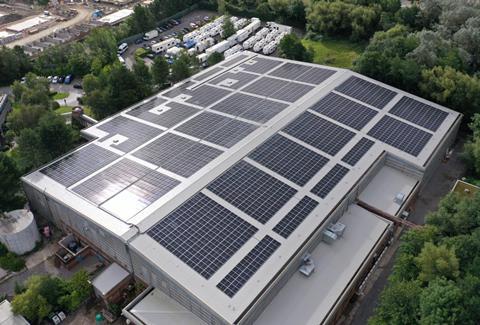
It is now a matter of principle for the British Film Commission (BFC) to ensure international productions coming to the UK operate in “the most environmentally sustainable manner they can,” says BFC business and industry development lead Gareth Kirkman.
That means that, just as they assist incoming productions with locations, studios and crew, the BFC can now put them in touch with specialists and advisors who can help reduce carbon footprints. “We have got a great network of partners and organisations throughout the UK,” says Kirkman. “The key is making sure they are linked up to production clients.
This is crucial because simple changes to on-set behaviour can make big differences to emissions — and budgets. Helping productions make those changes are experts like Tilly Ashton, a Wales-based production sustainability advisor who works for Cardiff-based Severn Screen and has assisted productions including Netflix’s forthcoming feature Havoc and BBC mini-series Steeltown Murders. Ashton highlights the savings that can be made by “sourcing second-hand, re-using set materials” and using green energy, such as battery generators.
It even extends to the catering; put veggie burgers on the menu instead of sirloin steak and you can make an immediate impact. If you are choosing 10 vegan meals, you’re looking at 5.2kg of carbon emissions,” notes Ashton. “If it’s 10 vegetarian meals. It’s 7.6kg of carbon emissions. Compare that to 10 meat-based meals, which is 47kg.” This meat-free tactic employed by ITVX/MGM drama The Winter King, which shot in Wales and south west England in 2022 and which deployed a number of sustainability initiatives.
Recycling food waste is also a key sustainability action; it can be used to generate “free electricity” or to make nutritious fertilisers. “For one production, over a five month shoot, we generated eight tons of food waste and compostables,” notes Ashton. “From that we generated over 2000 kilowatt hours of free electricity and lots of free fertiliser for local farmlands.”
As an advisor, Ashton is on set “all the time” during shooting, managing waste and recycling, collating data, “scrutinising every aspect and problem solving on a daily basis.” She also helps productions secure their sustainable production certificate from Bafta albert, the lead UK environmental organisation for the sector that was founded in 2011, which are now mandatory for all new commissions and recommissions of TV broadcast content.
Ashton says that sharing knowledge and initiatives is essential to real change. To help meet this need, Media Cymru has just launched a pilot training programme which will train six sustainability coordinators to work with the Welsh industry.
In 2022, the British Film Institute and Bafta albert launched the Screen New Deal Transformation Plan For Wales, which aims to provide a technical route map for the Welsh film and HETV industry to become a zero-carbon, zero-waste sector and so act as a blueprint for the rest of the UK. That’s been overseen by southwest-based freelance project manager Steve Smith, who is also managing Bafta albert’s Studios Sustainability Standard; a voluntary standard for studio facilities to identify key areas where they can reduce their environmental impact.
“We’ve got six broad themes: climate, which is around the energy studios use; circularity, which is about waste and materials, nature (protecting biodiversity); how we make studios people-friendly; management and data,” Smith explains.
Sky Studios Elstree, Three Mills and Warner Bros. Studios, Leavesden in south east England are among the facilities who have already signed up, as are Cardiff’s Wolf Studios and Scotland’s Wardpark Film and Television Studios and Bristol’s The Bottle Yard Studios, whose 1MWp community-owned solar rooftop (pictured above) took home the inaugural Global Production Award for Best Sustainable Initiative in 2023. Thirty-four studios are expected to be confirmed for the Standard by April 2024, with six in Wales alone.
A joined-up approach

Adam Wilkinson, sustainability manager of Irish Soup Productions who works closely with Northern Ireland Screen and its facilities and sustainability manager, Gavin Kelly, agrees that attention must be paid and changes implemented across every nation, region and sector. Starting his career in the locations department, Wilkinson “quickly noticed there was a lot of surplus waste going into large skips when it could have been redirected [to charities or recycled.]”
That now informs Wilkinson’s work with Irish Soup. “Recently, my company was responsible for clearing out a large warehouse with 11 years worth of costumes, props, sets and various production items,” he notes. “We used one single skip for general mixed waste - and that was only for the things beyond repair.”
Other initiatives being pushed by Northern Ireland Screen include the use of hydrotreated vegetable oils (HVOs) as an energy source, installing HVO tanks at local film studios that “can reduce emissions up to 95%,” says Wilkinson.
Sustainability is not just about making changes to on-set decisions, however, but embracing company-level change throughout the entire production chain. London-based Roxy Erickson is co-director of Creative Zero, a community interest company helping various suppliers (equipment, caterers, building etc), producers and trade associations within the music, creative tech, film and television industries to make better choices.
“Most sustainability efforts are still occurring at the production level,” she notes. “It’s great to have green stewards and sustainability managers on productions [but] what we would rather concentrate on is transforming one supplier, so every production they work on is more sustainable.
To that end, Erickson works closely with Laurence Johnson, sustainability manager at Film London. They partnered on The Fuel Project, whose first report (launched in November 2022) was partly inspired by Bafta albert’s figure that 50% of a production’s carbon footprint comes from fuel use across land transport and mobile power generator services.
“The report was really to give suppliers that missing link of knowledge about what carbonisation choices are out there already,” Erickson explains. “They’re the folk that are directly in control of these specific industry carbon emissions…because they own the trucks, they own the generators. They need industry engagement and support to make the necessary changes.
Now, phase 2 of The Fuel Report is underway, which aims to suggest what this collaborative work can look like. Around 100 companies have contributed to this exhaustive project, which aims map out the vehicles and generators owned by London-based film and HETV suppliers and set an industry pathway to decarbonisation for these technologies in London.
North of the border, Bectu Vision and Screen Scotland are also working with Film Bang, the long-established listings directory for film and TV production, on its ‘Reuse Hub’, a scheme launched in 2023 through which productions can share or sell everything from props and costumes to office supplies and which has already been used by Amazon’s The Rig.
“I feel that [the Hub] works better being run more locally because you’re looking for people to share these items and not have to travel far for them,” suggests Amy Hamilton, owner and manager of Film Bang. “I think you could have separate hubs foreach nation or large city.”
Across the UK’s nations and regions, experts are upbeat about progress already being made. Tilly Ashton believes there has been a sea-change in attitudes toward sustainability in the UK film and TV industry. She speaks of “empowering crews” to come up with their own ideas “developing best sustainable practice.”
The goal now is to ensure the sustainability information available is as accurate and thorough as possible, so everyone knows exactly what the targets are. “We can’t turn the super-tanker of this industry around unless we have engagement across the whole crew and supply chain. We need everybody doing this work.”








